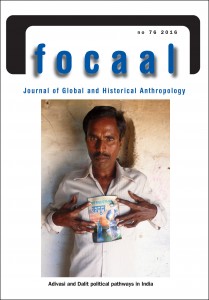Douglas Kellner in American Nightmare writes, “certainly [Donald] Trump is not Hitler and his followers are not technically fascists, although I believe that we can use the term authoritarian populism or neofascism to explain Trump and his supporters” (2016: 20). Kellner is not the only analyst who uses the terms fascism and populism interchangeably to describe Trumpism, nor is it the first time that populists have been branded as fascist. General Juan Perón’s contemporaries from the right and the left considered him a fascist in the 1940s.
All posts by Focaal Web Editor
Kate Crehan: Gramsci/Trump: Reflections from a fascist jail cell
Antonio Gramsci, condemned by Benito Mussolini to twenty years in prison, wrote his celebrated prison notebooks while sitting in a succession of fascist jails. He reflects on some of the following questions: why is Mussolini in power, while he and so many other leftists are in prison, dead, or in exile? What explained the defeat of the once powerful Italian left? How could fascist and other right-wing forces be defeated? Twenty-first century America is not mid- twentieth-century Italy, and Donald Trump is not Mussolini. Nonetheless, for those seeking to understand Trump’s electoral victory, and searching for ways that this American-produced, authoritarian populist might be effectively challenged, Gramsci’s notebooks make interesting reading.
Steven Sampson: Angry white males as suffering subjects
“They get bitter, they cling to guns or religion or antipathy to people who aren’t like them or anti-immigrant sentiment or anti-trade sentiment as a way to explain their frustrations.”
—Barack Obama, in a speech to donors during his 2008 campaign
The above remarks, made while Obama was running for president, are eight years old. But they echo Hillary Clinton’s critique of Donald Trump’s supporters as “deplorables.” Both Obama and Clinton were criticized as elitist for their remarks, and both quickly apologized (Pilkington 2008; Seelye and Zelenyi 2008). Perhaps they are a key to the left’s shock over Trump’s victory. Trump’s supporters—“the forgotten people,” as he calls them—were not shocked. They were confident he would win, as was Trump himself. A few weeks ago at the annual American Anthropological Association (AAA) meeting in Minneapolis, I sat in an auditorium full of dejected anthropologists, listening to our colleagues assess the US elections, Trump, and Trumpism.
Focaal Volume 2016, Issue 76: Adivasi and Dalit political pathways in India
 We are pleased to announce that the latest issue of Focaal – Journal of Global and Historical Anthropology has recently published and is available online at its new home, www.berghahnjournals.com/focaal.
We are pleased to announce that the latest issue of Focaal – Journal of Global and Historical Anthropology has recently published and is available online at its new home, www.berghahnjournals.com/focaal.
Gavin Smith: Out of the academic enclosure
Marc Edelman ends his recent piece on FocaalBlog, “The forces of justice and decency will need to move from feel-good slacktivism to the streets, to face-to-face engagement, whether lobbying, community organization, or classroom dialogues.” This got me thinking. In the following manner…[1]
Continue reading
Marc Edelman: The nastiest candidate won: Now what?
In the end it was filmmaker Michael Moore who got it right. It wasn’t Nate Silver of FiveThirtyEight.com, with his sophisticated polling models, or Nobel Prize winning economist and liberal pundit Paul Krugman, who confessed on election night that “I truly thought I knew my country better than it turns out I did.”
Continue reading
Leo Grob: Ruptures, Consolidations, Continuities: Reconsidering Global Economic Processes since 1945
This conference report was first published in H-Soz-Kult; the full conference program can be found here.
The 1970s increasingly move into the spotlight of contemporary history research. The decade is often portrayed as one of profound change, a radical rupture driven by watershed moments such as the oil crisis or the end of the Bretton Woods system of fixed currency exchange rates. This is not only the major take on the decade in recent publications by historians such as “Nach dem Boom” (Doering-Manteuffel and Raphael 2010) or “Age of Fraction” (Rodgers 2011), but also a well-established analytical approach across the social sciences and humanities (some of the most widely cited works in this regard are Harvey 1990, 2005). The international conference “Ruptures, Consolidations, Continuities: Reconsidering Global Economic Processes since 1945,” held at the Centre of Global Studies at the University of Bern, thus was a timely project to engage this paradigm. Over two-and-a-half days, researchers from the social sciences and the humanities came together to question the big “-isms” of 20th century-periodizations, such as Fordism, Post-Fordism, Keynesianism, and Neoliberalism.
Continue reading
Jonathan DeVore: Reflections on crisis, land, and resilience in Brazil’s politics of distribution
Brazil is at a critical juncture. Improvements in social welfare that have been achieved over the past two decades threaten to recede as the Workers’ Party (Partido dos Trabalhadores, PT) is removed from power. Yet the goods that have been objects of Brazil’s various social programs recede and persist in different ways. Once given, some things are harder to take away.
Lesley Gill and Norbert Ross: What’s class got to do with it?
Unsettled by Donald Trump’s bigotry and xenophobia, liberal pundits have struggled to understand his improbable anointment as the nominee of the Republican party. Many have sought answers in the experience and behavior of the white-working class, the bedrock of Trump support. Why, asks the New Yorker’s James Surolecki, would any working class person support Trump. Surolecki believes that part of the answer lies in the appeal of Trump’s nativist rhetoric. For William Galston, writing in Newsweek, working class whites vote for Trump because they “seek protection against all the forces that they perceive as hostile to their way of life—foreign people, foreign goods, foreign ideas.” And wary of Trump backers and their potential for violence if the Republicans lose the presidency, Salon’s Michael Bourne locates white working class anger in “1960s-era legislation for promoting the interests of immigrants and minorities over their own, just as they blame free-trade policies of both parties for sending their jobs offshore.” According to Bourne, they are either the hapless “victims of American progress or a bunch of over privileged bigots.”
Continue reading
Bruce Kapferer: Brexit and Remain: A pox on all their houses
A crisis is always good for humor. The English satirical magazine Private Eye caught the spirit of uncertainty and the possible tragedy of Brexit—that many of those who voted for it may have intensified their abjection as a result. One spoof comment for The Daily Turkeygraph (a composite of the conservative Daily Mail and Telegraph papers) written by Jeremy Paxo (a reference to the news commentator Jeremy Paxman, also a brand of stuffing mix) was headlined “TURKEYS VOTE FOR CHRISTMAS IN REFERENDUM CLIFFHANGE.R. Another for The Indepandent (sic, The Independent, a liberal/conservative paper) headlined “BRITAIN VOTES TO LEAVE FRYING PAN AND JUMP INTO FIRE.”
Continue reading
